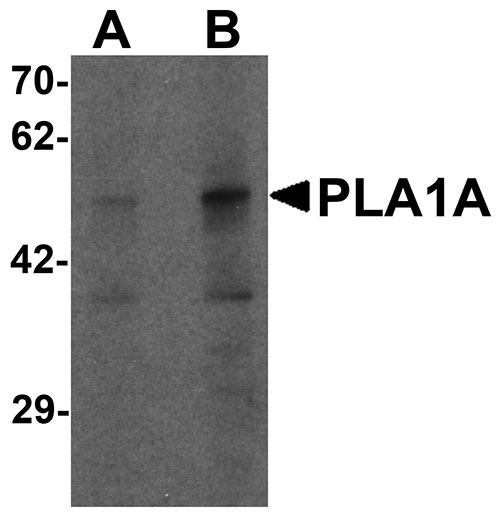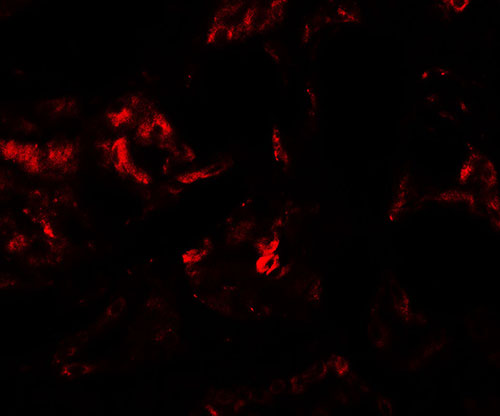PLA1A Antibody
- SPECIFICATION
- CITATIONS
- PROTOCOLS
- BACKGROUND

Application
| WB, IF, E |
|---|---|
| Primary Accession | Q53H76 |
| Other Accession | NP_056984, 7706661 |
| Reactivity | Human, Rat |
| Host | Rabbit |
| Clonality | Polyclonal |
| Isotype | IgG |
| Calculated MW | 50 kDa |
| Application Notes | PLA1A antibody can be used for detection of PLA1A by Western blot at 1 - 2 µg/mL. For immunofluorescence start at 20 µg/mL. |
| Gene ID | 51365 |
|---|---|
| Target/Specificity | PLA1A; At least three isoforms of PLA1A are known to exist; this antibody will detect all three isoforms. |
| Reconstitution & Storage | PLA1A antibody can be stored at 4℃ for three months and -20℃, stable for up to one year. As with all antibodies care should be taken to avoid repeated freeze thaw cycles. Antibodies should not be exposed to prolonged high temperatures. |
| Precautions | PLA1A Antibody is for research use only and not for use in diagnostic or therapeutic procedures. |
| Name | PLA1A (HGNC:17661) |
|---|---|
| Synonyms | NMD, PSPLA1 |
| Function | Hydrolyzes the ester bond of the acyl group attached at the sn-1 position of phosphatidylserines (phospholipase A1 activity) and 1- acyl-2-lysophosphatidylserines (lysophospholipase activity) in the pathway of phosphatidylserines acyl chain remodeling (PubMed:10196188). Cleaves phosphatidylserines exposed on the outer leaflet of the plasma membrane of apoptotic cells producing 2-acyl-1-lysophosphatidylserines, which in turn enhance mast cell activation and histamine production (By similarity). Has no activity toward other glycerophospholipids including phosphatidylcholines, phosphatidylethanolamines, phosphatidic acids or phosphatidylinositols, or glycerolipids such as triolein (By similarity). |
| Cellular Location | Secreted {ECO:0000250|UniProtKB:P97535}. |
| Tissue Location | Widely expressed. Expressed in placenta, prostate and liver. Weakly or not expressed in skin, leukocytes, platelets, colon, spleen, lung, muscle and kidney. |

Thousands of laboratories across the world have published research that depended on the performance of antibodies from Abcepta to advance their research. Check out links to articles that cite our products in major peer-reviewed journals, organized by research category.
info@abcepta.com, and receive a free "I Love Antibodies" mug.
Provided below are standard protocols that you may find useful for product applications.
Background
PLA1A Antibody: PLA1A is a phospholipase that hydrolyzes fatty acids at the sn-1 position of phosphatidylserine and 1-acyl-2-lysophosphatidylserine. This secreted protein hydrolyzes phosphatidylserine (PS) in liposomes and can also hydrolyze PS in apoptotic cells and activate platelets where the resulting 2-acyl-lysophosphatidylserine acts as a lipid mediator for mast cells, T cells, and neural cells, suggesting that a major function of PLA1A may be the production of lysophospholipid mediators. PLA1A is upregulated in rat peripheral blood cells bearing long-term surviving cardiac allograft. PLA1A is also expressed in human THP-1-derived macrophages and this expression is upregulated in cells treated with lipopolysaccharide, a TLR4 ligand. This upregulation is inhibited with corticosteroids, which are often used at high dosages to suppress chronic allograft rejection.
References
Sato T, Aoki J, Nagai Y, et al. Serine phospholipid-specific phospholipase A that is secreted from activated platelets. A new member of the lipase family. J. Biol. Chem. 1997; 272:2192-8.
Aoki J, Nagai Y, Hosono H, et al. Structure and function of phosphatidylserine-specific phospholipase A1. Biochim. Biophys. Acta 2002; 1582:26-32.
Hosono H, Homma M, Ogasawa Y, et al. Expression of phosphatidylserine-specific phospholipase A(1) mRNA in human THP-1-derived macrophages. Cell Transplant. 2010; 19:759-64.
If you have used an Abcepta product and would like to share how it has performed, please click on the "Submit Review" button and provide the requested information. Our staff will examine and post your review and contact you if needed.
If you have any additional inquiries please email technical services at tech@abcepta.com.













 Foundational characteristics of cancer include proliferation, angiogenesis, migration, evasion of apoptosis, and cellular immortality. Find key markers for these cellular processes and antibodies to detect them.
Foundational characteristics of cancer include proliferation, angiogenesis, migration, evasion of apoptosis, and cellular immortality. Find key markers for these cellular processes and antibodies to detect them. The SUMOplot™ Analysis Program predicts and scores sumoylation sites in your protein. SUMOylation is a post-translational modification involved in various cellular processes, such as nuclear-cytosolic transport, transcriptional regulation, apoptosis, protein stability, response to stress, and progression through the cell cycle.
The SUMOplot™ Analysis Program predicts and scores sumoylation sites in your protein. SUMOylation is a post-translational modification involved in various cellular processes, such as nuclear-cytosolic transport, transcriptional regulation, apoptosis, protein stability, response to stress, and progression through the cell cycle. The Autophagy Receptor Motif Plotter predicts and scores autophagy receptor binding sites in your protein. Identifying proteins connected to this pathway is critical to understanding the role of autophagy in physiological as well as pathological processes such as development, differentiation, neurodegenerative diseases, stress, infection, and cancer.
The Autophagy Receptor Motif Plotter predicts and scores autophagy receptor binding sites in your protein. Identifying proteins connected to this pathway is critical to understanding the role of autophagy in physiological as well as pathological processes such as development, differentiation, neurodegenerative diseases, stress, infection, and cancer.



